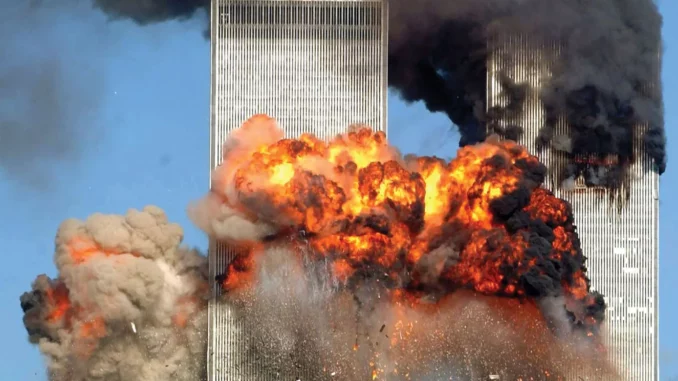
When the four airplanes hijacked by Al Qaeda’s terrorists crashed into the World Trade Center, the Pentagon, and in rural Pennsylvania on the morning of September 11, 2001, the world changed. While geopolitical developments affect the lives of millions indirectly, 9/11 changed the lives of hundreds of thousands drastically. Nearly 3,000 people died on that day. Those who were in the disaster areas in the days, weeks, and months to follow now live with devastating long-term physical and psychological health effects caused by toxic exposure, injuries, and the stress and trauma they experienced. Many of these people were overlooked for years and still need support. The 9/11 Notice Act addresses the neglect.
Around 400.000 people were exposed to toxic pollutants following the attacks, mainly in the New York City Disaster Area, including parts of Lower Manhattan and parts of Brooklyn within a 1.5-mile radius from the World Trade Center site. The collapse of the Twin Towers left the densely populated blocks of Lower Manhattan covered in dust, ash, and hundreds of thousands of tons of debris containing toxic contaminants and carcinogens like asbestos, silica, metals, concrete, and glass. The administration of the World Trade Center Health Program released an inventory of more than 350 chemicals and other biological, physical, and psychological hazards, so-called 9/11 agents, linked to the disaster. Fires burned for days, releasing carcinogenic gases, smoke, and combustion.
More than 91.000 first responders, firefighters, police officers, cleanup and construction workers, and voluntary rescue teams worked tirelessly, risking their lives to save others and to clean up the debris. Many got injured during the rescue, and many started reporting adverse health conditions in the years following 9/11. While funds were set up to treat the growing number of first responders getting sick, the effects of exposure to 9/11 agents on the thousands of civilians who lived, worked, and studied in the disaster area were initially overlooked. These survivors were encouraged to return to their jobs, schools, or residences only days after the attack, and most of them now suffer from similar conditions as responders do. The 9/11 Notice Act aims to reach out to these people and let them know there is Federal support they might be eligible to receive.
Federal Programs to help the victims
It took almost seven years and the tireless advocacy of public health workers until Congress finally expanded its 9/11 funding to provide free medical care and financial support for survivors, too, in 2008. The James Zadroga 9/11 Health and Compensation Act, passed in 2010, established two Federal programs to provide aid to responders and survivors of 9/11 until 2090.
The World Trade Center (WTC) Health Program pays for the medical monitoring and treatment of 9/11-related health conditions for responders and survivors who were present in the NYC Disaster Area on September 11, 2001, and who worked, resided, or attended school in the NYC Disaster Area between September 11, 2001 – July 31, 2002.
The September 11th Victim Compensation Fund (VCF) gives financial compensation to 9/11 responders and survivors who were present at the crash sites and the NYC Disaster Area at any point between September 11, 2001 – May 30, 2002, and whose health was affected as a result of the exposure. The fund also provides financial compensation to the families of deceased individuals. Only those individuals can register to receive the VCF whose physical condition was previously certified for treatment by the WTC Health Program. In some circumstances, previous treatments by private physicians are accepted if they are verified as 9/11-related illnesses.
The 9/11 Notice Act seeks to reach out to survivors who might need medical treatment and financial support, but they are not aware of the programs. The Act requires employers from businesses and institutions to notify former or actual employees who worked in the NYC Disaster Zone between September 11, 2001, and the end of May 2002 of their potential eligibility for the VCF or the WTC Health Program.
Why is the 9/11 Notice Act still relevant today?
Twenty-two and a half years later, aerodigestive conditions, various types of cancers, and mental health conditions are still being discovered among 9/11 victims. In the first years after the attacks, resources were primarily directed towards helping first responders struggling with debilitating illnesses. Until today, over 80% of the first responders have registered with the health and compensation programs. This is a horrific number pointing to the severe and widespread effects of 9/11 toxins. At the same time, it is a positive sign showing that the programs worked reasonably well. Undoubtedly, everyone who showed up and sacrificed so much on that day and after deserves all the possible support.
9/11 survivors breathed in tiny particles of the World Trade Center for months after the attacks. Many have been diagnosed with cancer, PTSD, aerodigestive conditions, and other illnesses. Still, only a small percentage of those with qualifying medical conditions have registered for the two programs, as the numbers illustrate. In December 2023, 42,620 survivors were registered with the WTC Health Program, and 39,917 were registered with the September 11th VCF. The numbers are staggering because hundreds of thousands of civilians were in and returned to the NYC Exposure Zone.
According to the statistics of the WTC Health Program, cancer is the third most common condition among responders and the first most common among survivors registered into the program. It is expected, though, that more people will be diagnosed in the future, as some conditions, such as lung cancer caused by asbestos, develop decades after the impact. More than 5.890 people have died already since the attacks due to the toxins in the air. This is more than the number of those who lost their lives on that tragic day. Spreading the information about the 9/11 Notice Act and the two Federal programs is vital. Most medical treatment, especially for cancer, is expensive. PTSD is linked to 9/11 and should be treated. Encouraging people we suspect might be eligible to receive help could save lives in the years to come.
About the author
Jonathan Sharp is a Chief Financial Officer at Environmental Litigation Group, P.C. The law firm, headquartered in Birmingham, Alabama, assists toxic exposure victims. Sharp is responsible for case evaluation, financial analysis, and asset management.





Be the first to comment